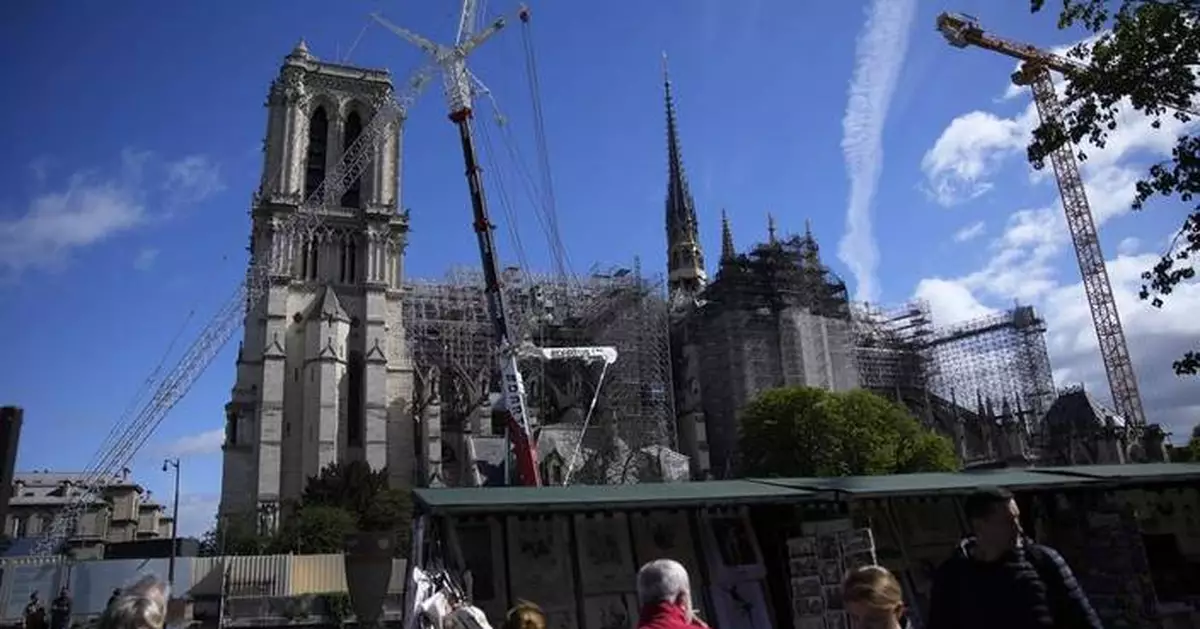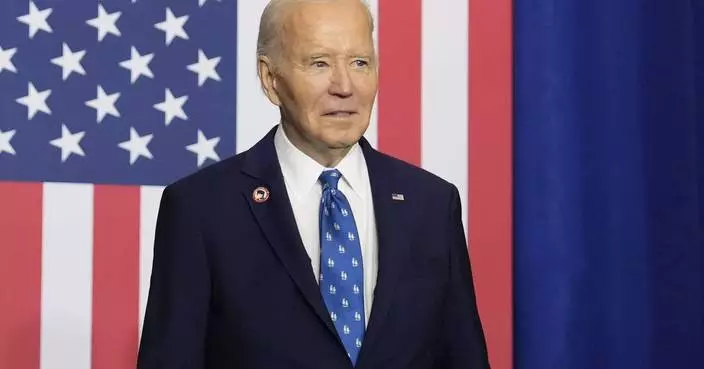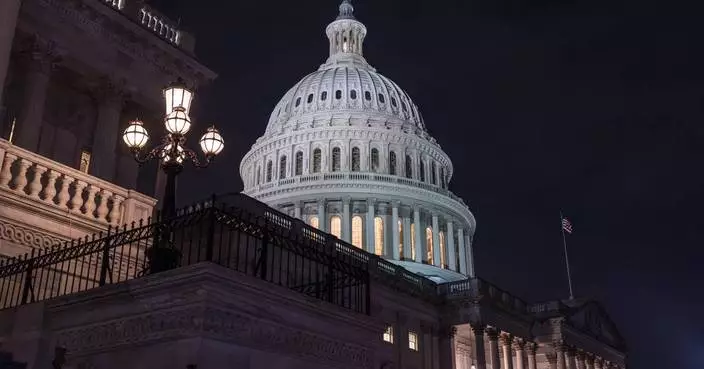PARIS (AP) — As Notre Dame gears up to reopen its doors in December, Paris is on the verge of a remarkable eco-revival, bringing nature back to the forefront of the City of Light.
Beyond restoring the cathedral's iconic spire and medieval charm, the city announced plans Tuesday to revamp Notre Dame's surroundings — to a tune of 50 million euros ($55 million) — into a serene, green oasis.
The project echoes a broader, post-Olympics eco-facelift that’s reshaping Paris from its historic monuments to its bustling avenues.
Among the key elements of this broader transformation are the revitalization of historic spaces like the Champs-Elysees and Place de la Concorde, a redesign aimed at reducing traffic around the Arc de Triomphe, and green promenades connecting the French capital's landmarks.
Here's a look at some of the eco plans for Paris in the coming years:
The reopening on Dec. 8 promises to be a historic moment for Paris, fulfilling President Emmanuel Macron’s vow made after the 2019 devastating fire for a five-year timeline. While the cathedral’s spire and oak-framed roof have been restored to their pre-fire glory, Paris City Hall's plans for the area around Notre Dame are bringing something new.
The ambitious, future-facing project will create 1,800 square meters (around 20,000 square feet) of green space and plant 160 trees, according to a news conference at City Hall that featured speeches from Paris officials, including Mayor Anne Hidalgo on Tuesday.
Hidalgo stated that the redesign will integrate nature and the Seine more fully into the area. Hidalgo emphasized that this transformation aims “to better highlight our beautiful cathedral and do it justice, while respecting its history.”
The redesign includes transforming the underground parking area into a visitor space complete with services and amenities. Additionally, the Seine’s adjacent quays will be revitalized, offering a new promenade along the river. A belvedere will provide panoramic views of the Ile Saint-Louis and the Seine, further enhancing the visitor experience.
The project will unfold in two phases, with the first, focusing on the parvis and surrounding streets, expected to be completed by the end of 2027. The second phase, which will include the renovation of Square Jean-XXIII and other nearby areas, is set to finish by 2030.
At the heart of Paris, the Place de la Concorde — home to the 3,300-year-old Luxor Obelisk — will undergo a significant overhaul between 2026 and 2027.
Paris officials have enlisted the input of a dozen architectural experts to envision how to preserve its rich history, while aligning the plaza with the city’s modern green ambitions. Expect more greenery and less traffic as the revamp balances historical significance with a fresh eco-friendly design.
Not everything has been a picnic in Paris’s post-Olympics makeover.
Two of France’s most high-profile female politicians — Hidalgo and Culture Minister Rachida Dati — are engaged in a fierce battle over the future of the Eiffel Tower, casting a shadow over the city’s plans for its famed monument.
Hidalgo has proposed to keep the Olympic rings affixed to the Eiffel Tower beyond the Games, which ended in August. She argues that the rings symbolize the “festive spirit” of the successful Paris Olympics and wants them to remain at least until the next Summer Games in Los Angeles in 2028.
Critics, however, say Hidalgo is using the Eiffel Tower as a political billboard to boost her image before the 2026 mayoral election, in which she is expected to face off against Dati.
Dati has been vocal in opposing the plan, arguing that the tower is a protected heritage site and can't be altered without proper consultation. She has accused Hidalgo of using the monument as a “personal campaign poster,” while Hidalgo counters that the rings are a harmless tribute to Paris’ Olympic success.
Dati has gone further, launching an ultimatum to push for the Eiffel Tower to be classified as a full historical monument — something Hidalgo has resisted. This would add extra layers of bureaucratic protection and control, potentially thwarting Hidalgo’s plans.
Paris’ Champs-Elysees, sometimes called “the most beautiful avenue in the world,” is receiving a 30-million-euro facelift, beginning with the renovation of its sidewalks, tree bases, and gardens that began in preparation for the Olympics.
With 150 proposals to “re-enchant the Champs-Elysees” over the coming years, this project aims to add even more green spaces and revive its historic charm, reinforcing its reputation as the world’s most beautiful avenue.
Changes to the Arc de Triomphe’s bustling roundabout are designed to reduce traffic flow and calm the surrounding environment.
Traffic lanes encircling the famous monument will be trimmed, while the central ring will be widened, allowing for a quieter, more accessible space.
Leading from the Arc de Triomphe to the Bois de Boulogne, the Avenue de la Grande Armee is also getting the green treatment. Authorities plan to recreate a historic green promenade, transforming this major traffic artery into a lush, tree-lined boulevard that reconnects the avenue with the nearby forest, historically converted into a public park in the 19th century under Napoleon III.
Paris’ Louvre Museum, the world’s most visited, will undergo its own transformation under the “Louvre 2030” project.
Though specific details remain sparse, the project aims to address the growing influx of visitors, with a significant redesign of Place du Louvre planned to help manage the crowds and provide a more tranquil, green environment for visitors.
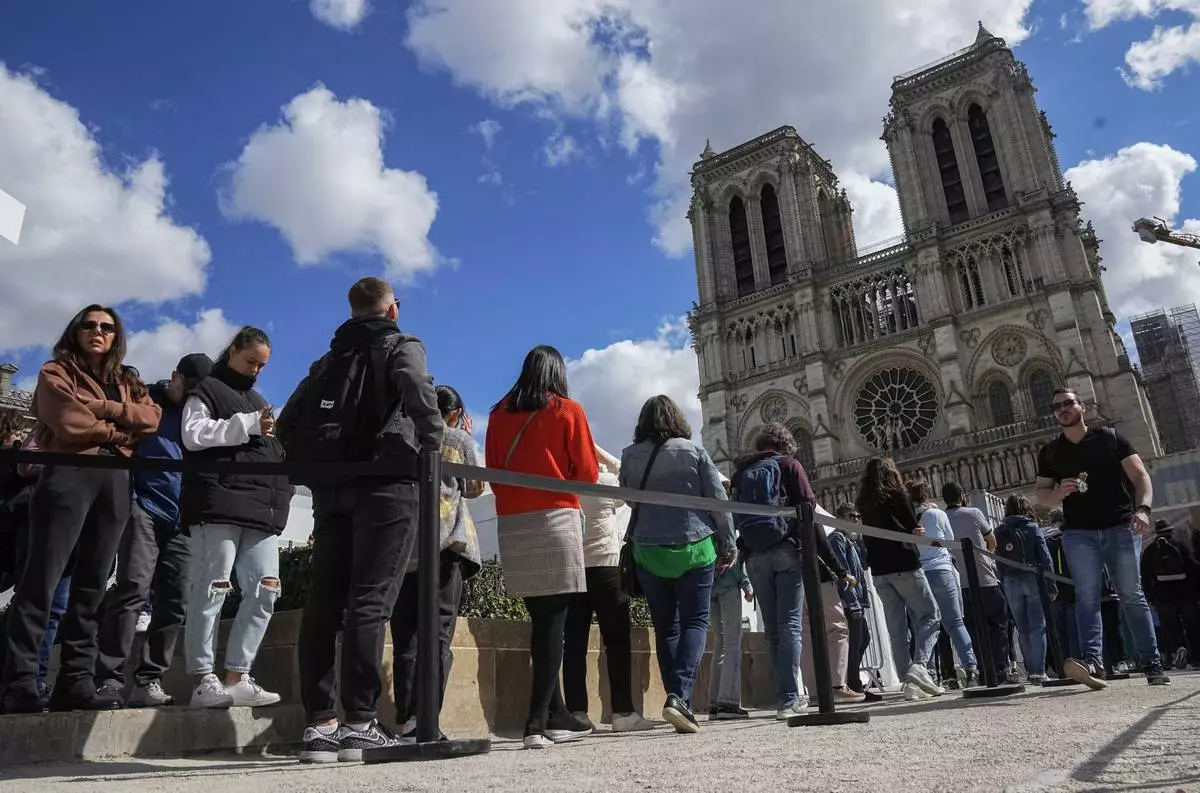
FILE - People line up to have a close look of Notre Dame cathedral as they visit the rebuilding site during Heritage Day in Paris, Sept. 17, 2022. (AP Photo/Michel Euler, File)
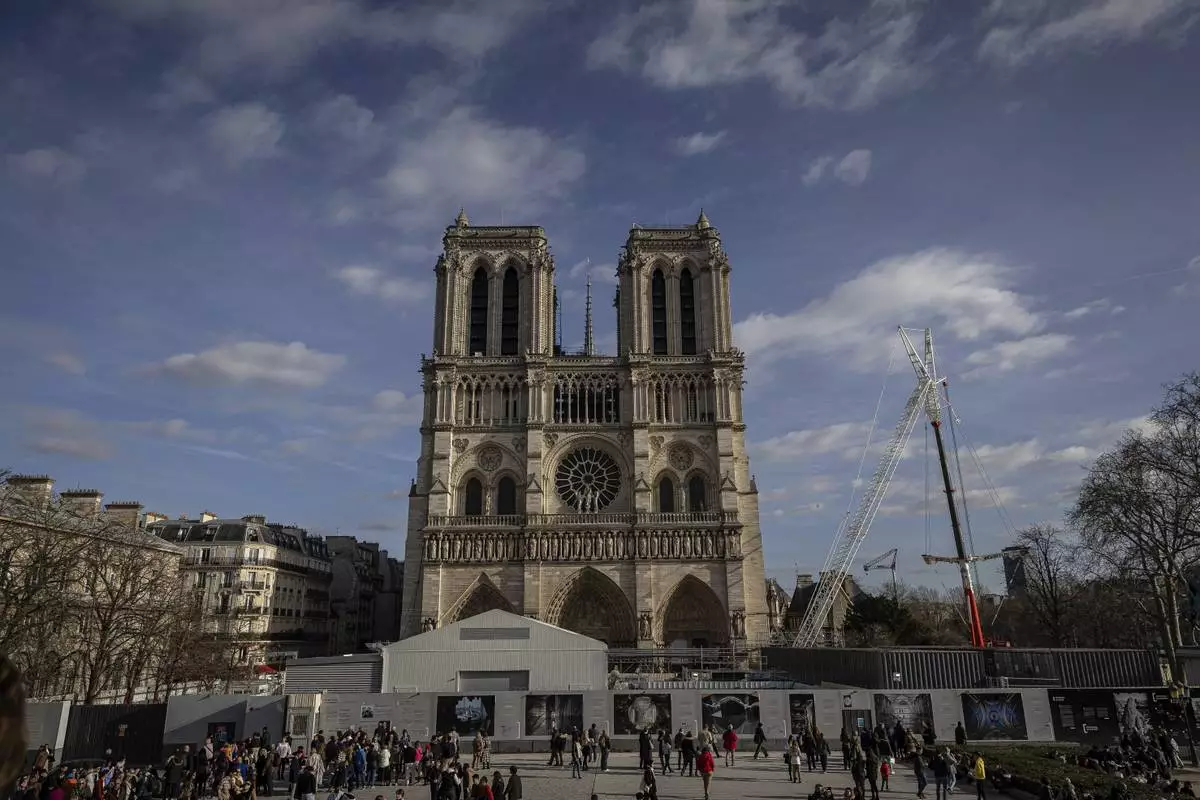
FILE - Scaffolding is being removed around the spire of Notre Dame de Paris cathedral, showing the rooster and the cross, in Paris, Feb. 17, 2024. (AP Photo/Aurelien Morissard, File)
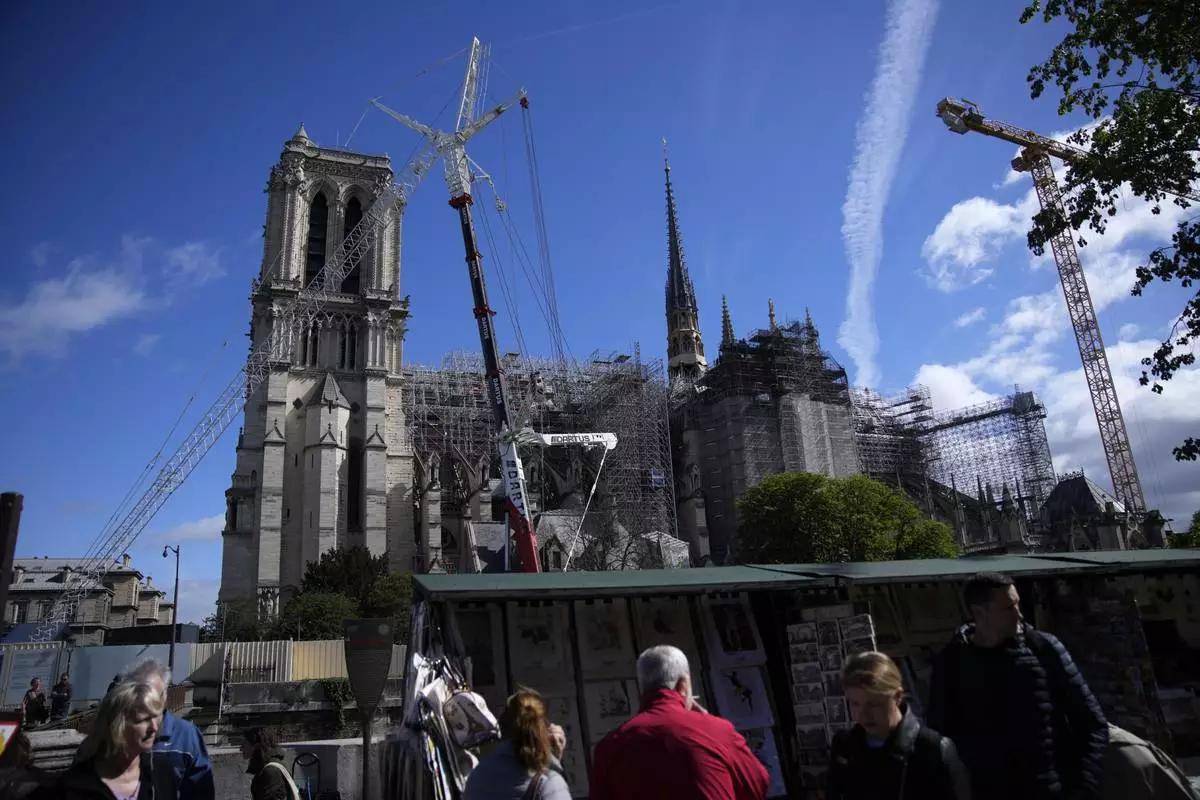
FILE - People walk past Notre Dame Cathedral in Paris, France, April 15, 2024. (AP Photo/Christophe Ena, FILE)
JEFFERSON CITY, Mo. (AP) — A white former Kansas City police officer who was convicted of involuntary manslaughter in the fatal shooting of a Black man was released from prison Friday after Missouri’s governor commuted his sentence to parole.
The decision by Republican Gov. Mike Parson to free Eric DeValkenaere came after months of public debate about the case, which had fueled both racial justice protests and impassioned pleas for mercy from DeValkenaere's supporters who asserted he had been unjustly convicted.
DeValkenaere was serving a six-year prison sentence. He was convicted in 2021 of killing 26-year-old Cameron Lamb as he backed into his garage. Lamb’s name was invoked frequently during racial injustice protests in Kansas City in 2020 following the police killing of George Floyd in Minneapolis. Lamb’s family even met with then-President Donald Trump that year.
Parson did not pardon DeValkenaere but rather shortened his sentence to parole, subject to normal restrictions against possessing firearms, traveling out of state without permission and other items. He granted a similar commutation of parole to Patty Prewitt, another high-profile prisoner who had spent 40 years behind bars for her husband’s killing.
The Department of Corrections confirmed both were freed Friday afternoon, before Parson publicly announced his decisions. DeValkenaere had been held in an out-of-state prison for his own safety, said Department of Corrections spokesperson Karen Pojmann.
Jason Johnson, president of the Law Enforcement Legal Defense Fund, which supports DeValkenaere, said they “will continue to fight to completely clear” his name. Johnson said in a statement that DeValkenaere had an outstanding record of service, adding: "While we strongly maintain that Eric is completely innocent, even those who do not must recognize that the ends of justice are not served by his incarceration.”
The clemency announcements came just weeks before Parson is to end his term, capping a historic string of such actions. Parson, a former rural sheriff, has pardoned or commuted the sentences of more than 800 people while clearing a backlog of more than 3,500 clemency requests he inherited upon taking office in June 2018. That's the most granted clemency cases of any Missouri governor since the 1940s. Most granted clemency had been convicted of lower-level crimes involving drugs or theft. But Parson also denied more than 3,000 clemency petitions.
Gwendolyn Grant, president and CEO of the Urban League of Greater Kansas City, said the DeValkenaere clemency decision will tarnish Parson's legacy and “will fuel deeper divisions and ignite justified outrage."
Grant called Parson's decision “nothing short of a flagrant endorsement of systemic racism and a betrayal of justice. By freeing a convicted officer who unlawfully killed Cameron Lamb, a young Black man, the governor has made it crystal clear that Black lives do not matter in the state of Missouri under his leadership.”
At trial, DeValkenaere testified that he fired his weapon on Dec. 3, 2019, after Lamb pointed a gun at another detective, Troy Schwalm, and that he believed his actions saved his partner’s life.
Prosecutors, however, argued that police shouldn’t have been on the property and staged the shooting scene to support their claims that Lamb was armed.
“DeValkenaere was convicted for killing an unarmed man. Period," Jackson County Prosecutor Jean Peters Baker said in a social media post Friday. “He was shown incredible mercy by the Governor. No such mercy was shown to the victims. Today we will focus our time caring for Cameron’s family rather than commenting further.”
Messages left with attorneys for the Lamb family were not immediately returned Friday.
Evidence presented during the trial, which was held without a jury at DeValkenaere’s request, showed that DeValkenaere kicked over a barricade to get into Lamb's backyard.
The trial judge, Dale Youngs, said the officers had no warrant for Lamb’s arrest and had no search warrant or consent to be on the property. He called it a tragic case with troubling facts and said DeValkenaere and the officer with him escalated a situation that had been calmed. He didn’t address allegations that evidence had been planted.
DeValkenaere left the police force after his conviction but remained free on bond until he lost his appeal in October 2023. The Missouri Supreme Court subsequently declined to hear an appeal.
DeValkenaere’s wife, Sarah DeValkenaere, took to social media earlier this week — as she had done often — urging followers to request a pardon.
“I miss him so much,” she said in a message on X in November. “So sad that an officer who dedicated his life to serving our city is now in prison for doing his job.”
Parson did not not offer an explanation for his clemency decisions while announcing them Friday. But he had previously acknowledged the pressure in an interview in August on KCMO Talk Radio.
“There’s not a week that goes by that somebody’s not reaching out to me about that issue, and we’re going to see what happens here before long. I’ll leave it at that. But you know, I don’t like where he’s at. I’ll just say that,” Parson said.
Prewitt, now 75, had filed multiple clemency requests over the years. She was serving a life sentence after being convicted of fatally shooting her husband, Bill Prewitt, in 1984 as he slept in their home in the rural east-central Missouri town of Holden.
Prewitt, a mother of five, said a stranger broke into the house. She declined a plea deal that would have given her the chance for parole after five to seven years. Prosecutors said Prewitt cheated on her husband and her ex-lovers testified at trial in 1985 that she had talked about killing Bill Prewitt.
But Patty Prewitt’s backers argued that her relationship with her husband was improving and that the evidence of her infidelity would not be allowed in court today. In addition, Georgetown University law students examining the case found prosecutors failed to tell defense attorneys that two days after Prewitt’s husband was killed, a neighbor told investigators she had seen a man parked at the end of a nearby dirt road in heavy rain on the night of the murder.
Hollingsworth reported from Mission, Kansas. Associated Press writer Steve Karnowski contributed from Minneapolis.

FILE - Former Kansas City police detective Eric DeValkenaere listens to witness statements during his sentencing hearing, March 4, 2022, in Kansas City, Mo. (Jill Toyoshiba/The Kansas City Star via AP, File)





